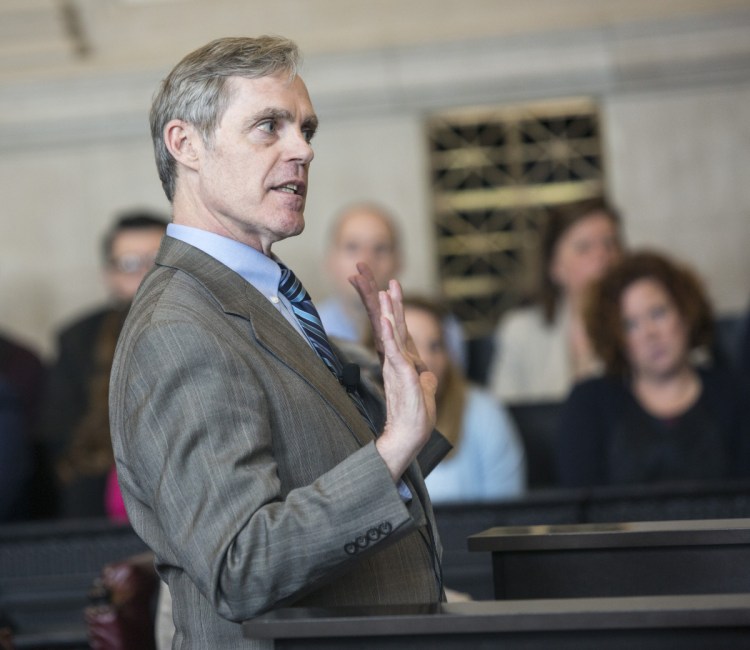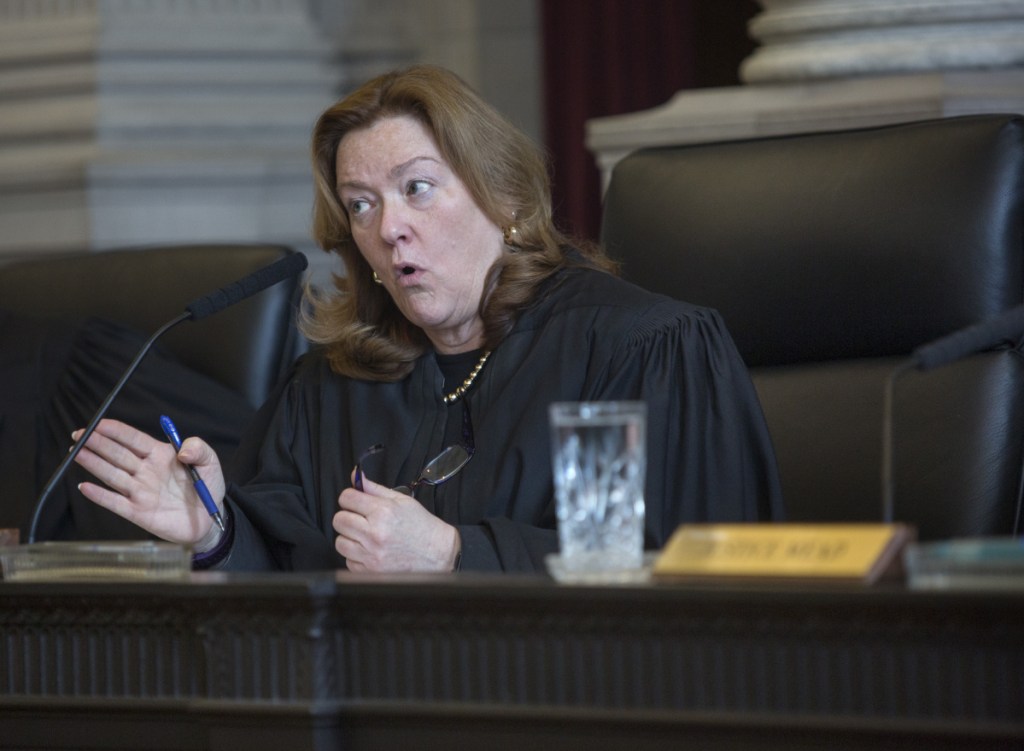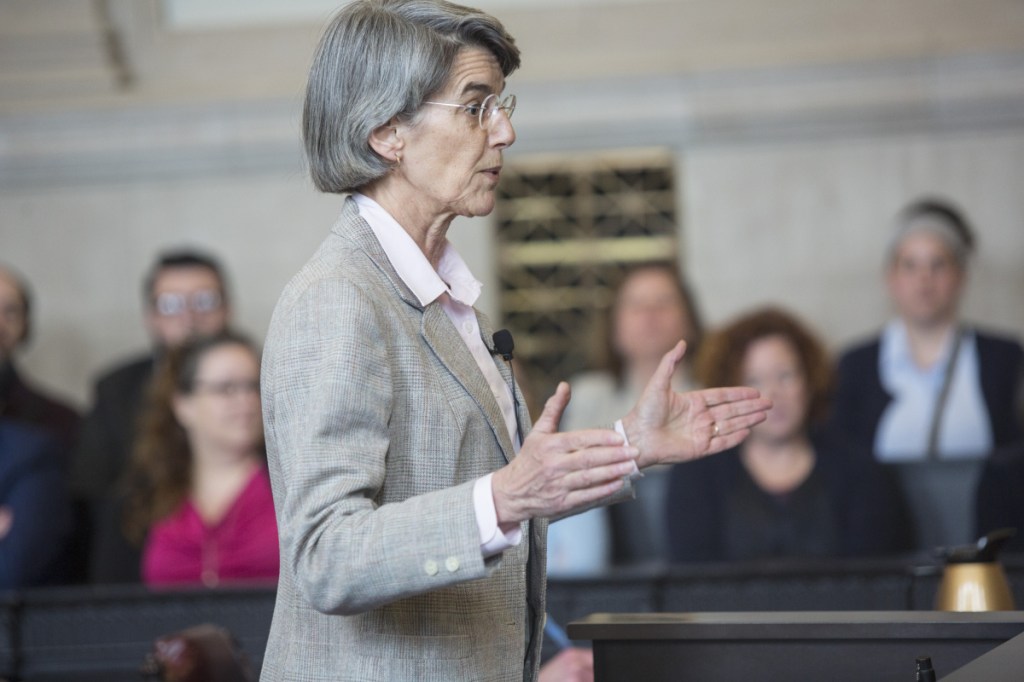Maine’s highest court is likely to rule quickly on legal questions around the state’s first-in-the-nation, ranked-choice voting law after a hearing Thursday marked by the justices’ pointed and skeptical questioning of attorneys involved in the case.
The case, which involves the Maine Senate, Secretary of State Matthew Dunlap and the Committee for Ranked Choice Voting that backed the law approved by voters in November 2016, is meant to settle whether the system can be used in the June 12 primaries.
Justices grilled attorneys for the three parties during the 50-minute hearing at the Cumberland County Courthouse in Portland, leveling their focus on Tim Woodcock, the lawyer representing the Republican-controlled Senate.
The justices appeared skeptical that the Senate had a strong case. Before Woodcock could finish his initial presentation, they repeatedly interrupted him, asking at one point why the Legislature had not fixed problems with the ranked-choice voting law it was now asking the state’s judicial branch to resolve.
Justice Donald Alexander noted that the Legislature has known for months that ranked-choice voting was the law, yet it has not acted to fix its flaws. The law court identified the constitutional flaws in an opinion issued in May 2017, in response to questions framed by the Senate itself.
Woodcock explained there was not enough consensus in the Legislature for that to take place, ironically highlighting one of the reasons why ranked-choice advocates say the electoral reform is necessary – to break up partisan dysfunction in government by pushing more candidates to moderate positions. Republicans, in Maine’s nearly evenly divided Legislature, have largely opposed the voting law change, while Democrats have mostly supported the shift.
Under Maine’s traditional voting system, candidates who get a plurality, or the highest vote total, are declared winners, even if they receive less than 50 percent in a race with three or more contestants.
In the ranked-choice system, voters would rank candidates in order of preference. If no one had a majority – more than 50 percent of the vote – after the first count, the candidate with the fewest votes would be eliminated. Voters who chose the eliminated candidate would have their ballots added to the totals of their second-ranked candidates, and the ballots would be retabulated. The process would continue until one candidate had a clear majority and was declared the winner.
QUESTIONING SENATE LACK OF ACTION
Some proponents believe that the ranked-choice system will promote moderation because a candidate who attacks competitors and takes extreme positions may be given a lower ranking by voters.
Woodcock said there is no language in state law or the Maine Constitution that expressly permits ranked-choice voting in a primary election. Therefore, he argued, if Dunlap spent money on a ranked-choice primary, he would be violating the separation of powers clause of the state constitution, which prohibits one branch of government from assuming the powers of another.
The justices seemed skeptical that the Senate alone could represent the entire legislative branch.
And Alexander was quick to point out that Dunlap was authorized by the Legislature to spend money on elections in general and that there has never been any specific instruction on what type of election he is required to conduct.
“The funds were appropriated to supervise an election, which is the secretary of state’s statutory and constitutional authority,” Alexander said. “It doesn’t parse elections between primary or general, or referendum or people’s veto or what.”
Chief Justice Leigh Saufley said the Senate was claiming a constitutional violation was taking place, but she sounded unconvinced, noting that primary elections are governed by statute and were not prescribed in the constitution.
She and other justices also asked why the Legislature had not acted to fix any of the recognized issues with the Ranked Choice Voting Act. “The Legislature is still in session, is it not?” asked Justice Ellen Gorman. “So the Legislature, if it were truly worried about this, could take some action between now and the day of its closing bell, rather than bringing an action in the third branch of government to bring this to a standstill.”
‘A LOOMING ELECTORAL CRISIS’
Woodcock said the Senate was only trying to get guidance from the court. “We are trying to get ahead of what we see as a looming electoral crisis,” he said.
If allowed to stand, ranked-choice voting would be used in Democratic and Republican primaries to select the parties’ nominees for governor on June 12. But ranked choice would not be used in the general election for governor in November.
Also at stake in June is whether a law passed by the Legislature that would ultimately repeal the ranked-choice voting law, if an amendment to the state’s constitution is not made, is allowed to stand. The ranked choice repeal law that passed in October 2017 during a special legislative session is the subject of a people’s veto measure.
If the people’s veto passes in June, it would mean Maine would keep ranked-choice voting for primary elections and for the statewide elections for candidates to Congress.
For the coming gubernatorial primary there are four Republican candidates and seven Democratic ones who would be subject to ranked-choice voting. The system also would be used to settle a Democratic primary in the 2nd Congressional District in which five candidates are vying to be the party’s nominee to challenge Rep. Bruce Poliquin, the Republican incumbent.
At the state level, only one State House primary race – a three-way contest between Republicans in Turner vying be the party’s nominee for an open seat in House District 75 – will use ranked-choice voting.
It was a fact not lost on Saufley, who noted Thursday that the state Senate had no incumbents seeking re-election or candidates who would be subject to a ranked-choice primary in June.
“There is no election involving the Senate in which ranked-choice voting could come into play,” Saufley said.
Thursday marked the second time in two years that the Supreme Judicial Court has heard arguments on the ranked-choice law that received the approval of 52 percent of voters in 2016.
TIME SHORT FOR COURT’S RULING
In its advisory opinion to the Senate in May 2017, the court said the law could not be applied to statewide general elections for governor and the Legislature. But because the Maine Constitution does not address primary or federal congressional elections, the court issued no guidance on those issues.
Thursday’s hearing followed a pair of complaints filed in Kennebec County Superior Court in March and April. The first complaint was filed by the Committee for Ranked Choice Voting, seeking to require Dunlap to move forward with a ranked-choice primary. The Senate filed a separate complaint asking the court to resolve constitutional questions around Dunlap’s authority to spend state funds on a ranked-choice election, as well as possibly take possession of and transport ballots from local municipalities to move them to a central location for tabulation.
The law court is likely to rule soon because Dunlap’s office has said it needs to have ballots ready for printing and distribution by April 27. The Attorney General’s Office previously had said Friday was the deadline for allowing enough time to design, proof and print ballots in time to get them to absentee voters serving in the military.
But Phyllis Gardiner, an assistant attorney general representing the Secretary of State’s Office, said Thursday that Dunlap already was designing the ballots and believed he would have time to complete the process if a final ruling came by April 20.
Scott Thistle can be contacted at 713-6720 or at:
sthistle@pressherald.com
Twitter: thisdog
CORRECTION: This story was updated at 10:50 a.m. Friday April 13, 2018, to correct the attribution of a quote.
Send questions/comments to the editors.





